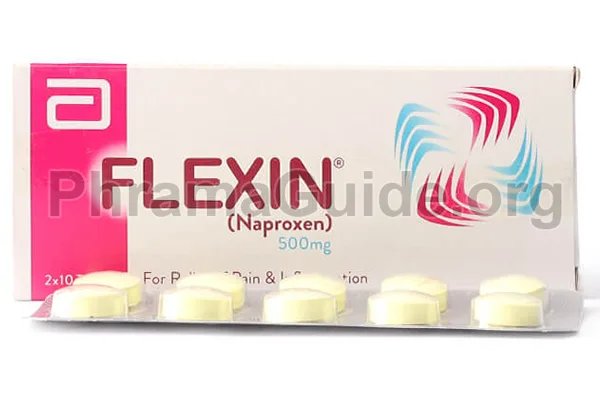Flexin is a nonsteroidal anti-inflammatory drug (NSAID) commonly used to relieve pain and reduce inflammation. Like all medications, Flexin can have both common and less common side effects.
Common Side Effects
- Gastrointestinal issues: Flexin can irritate the stomach lining and may cause common side effects such as stomach pain, heartburn, nausea, and indigestion. It can also lead to more serious gastrointestinal problems like ulcers or bleeding, although this is less common.
- Headache: Some people may experience headaches as a side effect of Flexin.
- Dizziness: Flexin can sometimes cause dizziness or lightheadedness.
- Fluid retention: You may notice swelling with Flexin use, particularly in the ankles and feet, due to fluid retention.
- High blood pressure: In some cases, Flexin can lead to an increase in blood pressure.
- Skin rashes: Skin reactions, including rashes or itching, can occur as a side effect of Flexin.
- Minor allergic reactions: While rare, some individuals may experience allergic reactions, such as hives or itching.
Less Common and More Serious Side Effects
- Gastrointestinal bleeding: Flexin can sometimes cause severe gastrointestinal bleeding, which may result in black, tarry stools or vomiting blood. This is a serious side effect and requires immediate medical attention.
- Kidney problems: Flexin can affect kidney function, leading to reduced urine output, swelling, or unexplained weight gain. It’s important to report these symptoms to a healthcare provider.
- Liver problems: While less common, Flexin can lead to liver issues, such as jaundice (yellowing of the skin and eyes), dark urine, and upper abdominal pain. Seek medical attention if these symptoms occur.
- Cardiovascular issues: There have been concerns about the potential for NSAIDs, including Flexin, to increase the risk of heart attacks and strokes, especially with long-term or high-dose use. Your risk may be higher if you have existing cardiovascular problems.
- Severe allergic reactions: Rarely, Flexin can cause severe allergic reactions, including difficulty breathing, and swelling of the face, lips, tongue, or throat. These reactions require immediate medical attention.
- Ringing in the ears (tinnitus): Tinnitus, or ringing in the ears, can be a less common side effect of Flexin.

What is Flexin?
Flexin is one of the leading brands of Naproxen, manufactured and marketed by Abbott Laboratories Pakistan.
Flexin : Available Formulations and Strengths
Presently, Flexin is available in Tablet Form.
Flexin Tablets : 250mg and 500mg strengths.
What Are The Possible Drug Interactions of Flexin?
- Other NSAIDs: Concurrent use of multiple NSAIDs, such as ibuprofen or aspirin, can increase the risk of gastrointestinal bleeding and other side effects. It’s generally not recommended to take Flexin combine with another NSAID at a time.
- Anticoagulants and antiplatelet drugs: Flexin can interfere with the blood-thinning effects of anticoagulants like warfarin and antiplatelet drugs like aspirin, potentially increasing the risk of bleeding. Your healthcare provider should monitor your blood clotting parameters closely if you need to take both types of medications.
- Corticosteroids: Combining Flexin with corticosteroids, like prednisone, may increase the risk of gastrointestinal problems, including ulcers and bleeding.
- Selective serotonin reuptake inhibitors (SSRIs): There is a potential risk of bleeding when Flexin is taken with SSRIs like fluoxetine or sertraline. Your healthcare provider may need to monitor you more closely.
- Angiotensin-converting enzyme (ACE) inhibitors and angiotensin receptor blockers (ARBs): Taking Flexin with these medications, often prescribed for high blood pressure and heart conditions, may reduce the effectiveness of the blood pressure-lowering effects of these drugs.
- Diuretics: Flexin can reduce the effectiveness of diuretics, which are often used to manage conditions like hypertension and edema (fluid retention).
- Lithium: Flexin may increase the levels of lithium in the blood, potentially leading to lithium toxicity. Regular monitoring of lithium levels is crucial when used in combination.
- Methotrexate: Concurrent use of Flexin and methotrexate can increase the risk of methotrexate toxicity. Regular monitoring of blood counts and liver function is important if you’re taking both drugs.
- Cyclosporine: The combination of Flexin and cyclosporine, an immunosuppressive drug, can lead to kidney damage. Regular kidney function monitoring is essential.
- Digoxin: Flexin may increase the levels of digoxin in the blood, potentially leading to digoxin toxicity. Your healthcare provider should monitor your digoxin levels.
- Other medications: Some medications for specific conditions like high blood pressure, heart disease, or diabetes may interact with Flexin. Always inform your healthcare provider about all your medications and medical conditions to ensure safe and effective treatment.

Leave A Comment